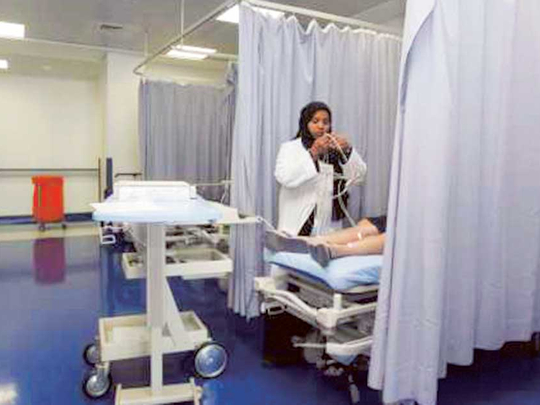
|
Abu Dhabi: The new medical liability law adopts human rights in patient care, protecting rights of patients, physicians and health-care providers, a senior official has said.
The Medical Liability Law was decreed last month by President His Highness Shaikh Khalifa Bin Zayed Al Nahyan and took effect early this month after publishing in the official gazette.
“The new law aims to ensure fair treatment for patients, doctors and hospitals, so a better balance within the country’s health-care system is created,” Dr Ameen Al Amiri, assistant undersecretary of the Ministry of Health and Prevention for Public Health Policy and Licensing, told Gulf News.
The law guides health-care services to obtain malpractice insurance, outline doctor’s responsibilities and also details the process of investigation and disciplinary proceedings in cases of alleged malpractice.
Under the law, patients can report any malpractice or medical negligence by service providers or pharmaceutical companies directly to the health authorities.
Complaints will be referred to a medical liability commission set up by the Minister of Health and Prevention or the chairman of the local health authority.
The commission will decide whether there is a malpractice, how gross is it, who is accountable for the malpractice, its causes and results.
Patients, doctors and providers can appeal the decision of the commission, within 30 days, to a higher liability commission, set up by the Cabinet.
The higher commission will take a decision, which is final and binding on all parties involved.
For malpractice to be classed a criminal act, it has to be deemed ‘gross malpractice’ by the higher medical liability commission.
Dr Al Amiri explained that victims of malpractice or medical negligence can take action against their physician in three different ways: They can file a complaint with the local health-care authority, bring a civil prosecution case before the courts, and — if the result of the malpractice was serious enough — even pursue a criminal case against the doctor or the health-care provider with the public prosecutor.
Arrest
“In all cases, doctors and medical technicians may not be arrested, questioned or detained unless a final decision by the higher medical liability commission is made to the effect that a gross medical malpractice has been committed,” Dr Al Amiri said.
If the malpractice and resulting harm suffered are deemed serious enough to bring a criminal prosecution, the doctor may face a prison term of up to a year, or a fine of up to Dh200,000 or both.
These fines are payable to the authorities and are in addition to any financial compensation awarded to the victim by a civil court.
If the gross malpractice leads to death, then the penalty will be a prison term of up to two years, or a fine of up to Dh500,000 or both.
And if the cause of the malpractice is found to be due to the physician’s misuse of alcohol or narcotics, then the fine could be increased to Dh1 million.
Dr Al Amiri said cases involving gross medical negligence or malpractice are ruled upon in the criminal courts, which must refer to the final decision and expert medical evidence by the higher medical liability commission before shaping their decisions.
“The law, however, offers a huge relief to physicians and health-care providers, allowing amicable out-of-court settlement at any time, even after a final court ruling is issued. The settlement means that the criminal lawsuit is dismissed and the prosecutors order suspending any penalty, if the settlement is reached during its execution,” Al Amiri said.
The settlement, however, does not affect the rights of the victim to seek compensation before the civil court. And settlement ceases to be an option in the event of recurrence of the same gross malpractice or medical negligence.
Exemption
The law exempts doctors from medical liability if harm to a patient is self-inflicted, a result of rejecting taking medicines or failure to heed medical instructions.
Doctors will not be liable for prosecution if the treatment or the method adopted is different but in keeping with recognised medical standards, according to the law.
Doctors will also not be taken to account if standard or unexpected side effects or possible complications occur, but not resulting from medical malpractice.
Doctors are prohibited from treating patients without their consent unless in emergency cases that require urgent intervention and if informed consent by the patient is impossible.
Doctors are not permitted to uncover patients’ secrets unless this is done with consent of the patient, if it is for the good of the wife or husband, provided that the secret is informed to either of them in person.
Doctors are also permitted to share secrets if it is meant to prevent a crime from taking place or reporting it or if the doctor is assigned by the judicial authority to give expert testimony.













